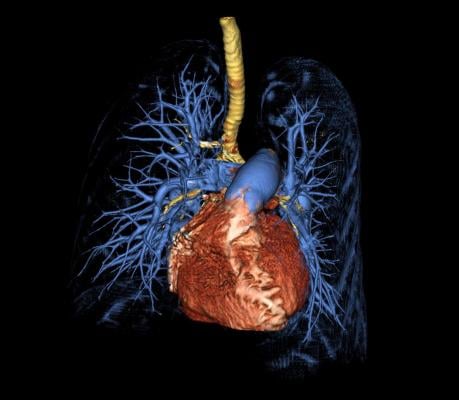
September 12, 2022 — Researchers at the National Institutes of Health have found that a novel blood test can be used to easily evaluate disease severity in patients with pulmonary arterial hypertension (PAH) and predict survivability. PAH is a rare, life-threatening condition that causes unexplained high blood pressure in the lungs. In early clinical studies, the researchers showed the test to significantly improve upon conventional tests, some of which use invasive tools.
The new blood test measures DNA fragments shed by damaged cells. Researchers found that these fragments, called cell-free DNA, were elevated in the blood of patients with PAH and increase with disease severity. If future studies confirm the findings, this first-of-its-kind blood test for PAH patients could allow doctors to intervene faster to prevent or delay progression of the disease and possibly save lives. Cell-free DNA is a relatively new analytical technique that is growing in its potential medical uses, which include the early detection of heart- and lung-transplant rejection as well as early detection of cancer.
The study was funded by the National Heart, Lung, and Blood Institute (NHLBI) and the NIH Clinical Center, both part of NIH. The findings will appear online in the journal Circulation, a publication of the American Heart Association.
PAH is a rare form of pulmonary hypertension that can cause difficulty breathing, chest pain, and fatigue. The disease, whose exact cause is unknown, is estimated to affect less than 50,000 people in the United States, according to the NIH’s Genetic and Rare Diseases Information Center. It is characterized by progressive narrowing and blockage of the small pulmonary arteries of the lungs, strain on the right side of the heart, and eventual death from heart failure. The damage to the lung in severe cases can require lung transplantation. Patients with PAH have a high death rate, and the condition mostly affects women. Despite treatment advances, it currently has no cure.
Current tests used to monitor PAH severity rely on established risk prediction scores based on clinical symptoms and on the use of an invasive catheter to measure pressure in the lungs. Doctors sometimes use echocardiography, or heart imaging, to measure pressures in the heart as an indirect measurement of lung pressure, but these tests tend to lack reliability and sensitivity.
“Researchers have been actively searching for novel, less-invasive approaches to evaluate PAH severity, disease progression, and response to therapy for more than a decade. These cell-free DNA analyses represent progress toward that goal,” said study co-author Michael A. Solomon, M.D., M.B.A., who is part of the NHLBI Cardiovascular Branch and co-director of the NIH Clinical Center Pulmonary Arterial Hypertension Section.
Sean Agbor-Enoh, M.D., Ph.D., study co-author and chief of the NHLBI’s Laboratory of Applied Precision Omics, agreed. “Here we’re proposing a one-time test where you collect a vial of blood from a patient and use that to predict survival. We’re very encouraged by the early results.”
In the current study, the research team analyzed cell-free DNA from blood samples taken from 209 adult patients, predominately women, diagnosed with PAH at two large U.S. medical centers. The researchers compared the results to cell-free DNA measured from a control group of 48 healthy volunteers without PAH at the NIH Clinical Center.
They found that cell-free DNA was elevated in patients with PAH, and also found that cell-free DNA concentrations increased in proportion to the severity of the disease. Patients with the highest level of cell-free DNA had a 3.8 times greater risk of either death or a need for lung transplantation compared to those with the lowest level of cell-free DNA, the researchers said.
Further analyses of cell-free DNA samples revealed that multiple tissue types – including the heart, blood vessels, fat tissue, and inflammatory cells circulating in the blood – were affected by PAH. The new blood test will allow researchers to better pinpoint the specific tissues involved in the PAH disease process. This knowledge may lead to new drug interventions for PAH, whose current treatment options may slow but not halt or reverse disease progression.
For more information: www.nhlbi.nih.gov


 February 03, 2026
February 03, 2026 









